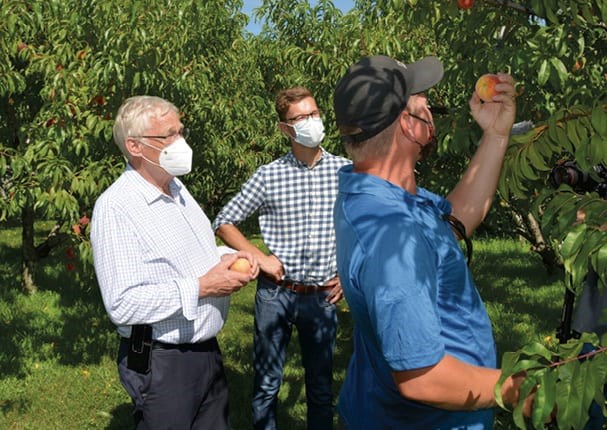It was a glorious summer day on Monday, Aug. 10, in the heart of peach country, and a perfect opportunity for Ontario’s Minister of Agriculture, Food and Rural Affairs, Ernie Hardeman, to learn more about the tender-fruit eco-system in Niagara.
The Minister’s theme? “Buy grown-in-Ontario.”
Hardeman had been invited by Niagara West MPP Sam Oosterhoff to tour the DeVries Farm in Fenwick, and its recently expanded storage, production, and retail operations.
“Some of the best tender fruit in the country is grown right here,” proudly proclaimed Oosterhoff, having just taken a bite of a juicy peach. “We have agriculture people from around the world coming to Niagara to gain industry insights and tap the expertise of our farmers.”
He added that many of the peach, apple, and plum varieties grown in Niagara were bred at the nearby Vineland Research and Innovation Centre.

Farmers got some good news recently, as Hardeman announced $50 million in additional funding for the Ontario Risk Management Program, which he says will benefit farmers in Niagara and beyond as they deal with market volatility and other risks beyond their control like flooding, drought, and disease.
“We listened to feedback from the farming sector, and accelerated our promise to increase the Risk Management Program to $150 million a year earlier than planned,” said the Minister.
"Our government stands shoulder to shoulder with our farmers during these unprecedented times, said Premier Doug Ford through a government statement. “As we chart a path to recovery, we will be there for our farmers and their workers to help them continue to put food on our tables.”
Farmers can also access the $15 million Enhanced Agri-food Workplace Protection Program, which provides safety measures for employees, such as personal protective equipment, medical testing, cleaning and disinfection, and modifications to the workplace to boost physical distancing. Unexpected COVID costs for housing and transportation are also covered.
Field Manager Dan DeVries, who led the entourage through the orchards and the farm’s new controlled-climate storage facilities, noted that farmers can’t simply grow crops like they did 25 years ago.
“Innovation and product improvement is an ongoing process to provide the consumer with the best quality and selection,” he said.
Innovation and product improvement is an ongoing process to provide the consumer with the best quality and selection
Proof is seen in the farm’s 20 varieties of apples, with new hybrids continually being tested.
Hardeman praised farm innovation and research as he plucked a ripe peach from the tree.
“They are breeding for traits, like extended shelf life. If you’re trying to get peaches to market and consumed two days after they’re picked, that's not going to be sustainable. So you have to develop a longer shelf life…it just makes sense for the industry,” he said.
The DeVries Fruit Farm is truly a family-run endeavor. Leo, the patriarch, and his wife Margaret bought the property back in 1984, and have been joined by sons Dan and Mark, and daughter Andrea, in the business. They plant and harvest a broad range of fruits and vegetables on their 250 acres, including such favorites as peaches, plums, cherries, and strawberries in the summer, and grapes, apples, and pears in the fall. In search of fresh corn, asparagus, squash, or pumpkins? They’ve got it, in season. And they have expanded their retail store to include a wide selection of preserves, pies, maple syrup, eggs, cider, and canned goods.
DeVries Fruit Farm produce is also available at farmers markets throughout the region. A portion of the fall crop is donated to Niagara Christian Gleaners in West Lincoln, who use surplus produce to feed the hungry.
The farm has nine wind generators in place throughout the property, and DeVries considers them to be “absolutely indispensable.” The turbines mix up the air, making nights warmer and days cooler. These effects help the crops by making frosty nights less common, and reducing the number of sweltering days that stress plants. It is a big investment, as is the installation of trickle irrigation, which mitigates the agricultural risk when rain is infrequent.
“The payback has been huge in terms of crop consistency,” said DeVries.
Like his father, DeVries is passionate about farming, a profession which he feels has great dignity.
“Agriculture is one of our most important industries, like healthcare and education,” he said. “Growing quality food in this province has got to be on our radar. COVID was a wake-up call for many people, who realized that you can’t just get stuff overnight. If the borders are closed, the more food that we can source locally the better.”
He noted that the three giant food providers in Canada—Loblaws, Sobeys, and Metro—control the marketplace, and accordingly dictate prices. “That’s why we've gone in a different direction with our business, trying to retail more of the crop ourselves and direct market to stores,” said DeVries.
During peak periods, the farm staff totals 35, of which 18 are seasonal migrant workers from offshore. Farming is a labour-intensive business, and migrant workers are essential.
“We couldn’t do without them,” said DeVries. “If we didn't have them, there would be a lot less grown in Niagara. When it's 90 degrees, with a relative humidity of 70 percent, it’s the migrant workers who are in the fields, doing the work.”
He bristles at the occasional negative media report which cites instances of mistreatment of offshore workers.
“We are respectful of our workers. That’s why they keep coming back, year after year.”
DeVries speaks of the farm and their labour with a deeply-rooted reverence.
“We believe that this is our calling…to grow food for people. We're a family of faith, and we want to provide for our community with high quality produce and fruit at a fair price.”
Ontario has an estimated 49,600 farms that contribute almost $7.6 billion annually to the province’s economy.


